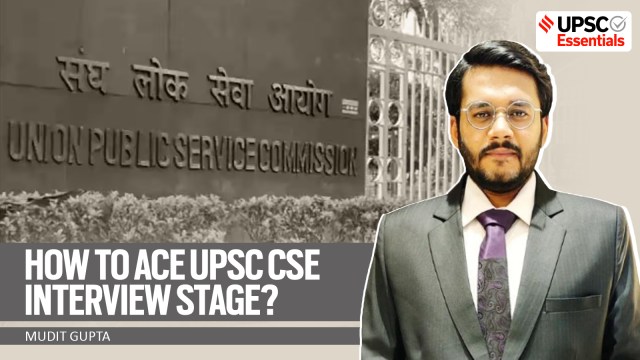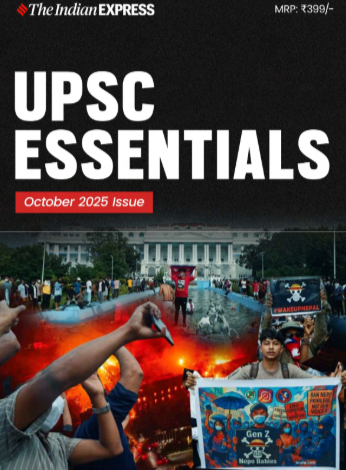Manas Srivastava leads the UPSC Essentials section of The Indian Express (digital). He majorly writes on UPSC, other competitive exams and education-related projects. In the past, Manas has represented India at the G-20 Youth Summit in Mexico. He is a former member of the Youth Council, GOI. A two-time topper/gold medallist in History (both in graduation and post-graduation) from Delhi University, he has mentored and taught UPSC aspirants for more than five years. His diverse role in The Indian Express consists of writing, editing, anchoring/ hosting, interviewing experts, and curating and simplifying news for the benefit of students. He hosts the YouTube talk show called ‘Art and Culture with Devdutt Pattanaik’ and a LIVE series on Instagram and YouTube called ‘LIVE with Manas’.His talks on ‘How to read a newspaper’ focus on newspaper reading as an essential habit for students. His articles and videos aim at finding solutions to the general queries of students and hence he believes in being students' editor, preparing them not just for any exam but helping them to become informed citizens. This is where he makes his teaching profession meet journalism. He is also the editor of UPSC Essentials' monthly magazine for the aspirants. He is a recipient of the Dip Chand Memorial Award, the Lala Ram Mohan Prize and Prof. Papiya Ghosh Memorial Prize for academic excellence. He was also awarded the University’s Post-Graduate Scholarship for pursuing M.A. in History where he chose to specialise in Ancient India due to his keen interest in Archaeology. He has also successfully completed a Certificate course on Women’s Studies by the Women’s Studies Development Centre, DU. As a part of N.S.S in the past, Manas has worked with national and international organisations and has shown keen interest and active participation in Social Service. He has led and been a part of projects involving areas such as gender sensitisation, persons with disability, helping slum dwellers, environment, adopting our heritage programme. He has also presented a case study on ‘Psychological stress among students’ at ICSQCC- Sri Lanka. As a compere for seminars and other events he likes to keep his orating hobby alive. His interests also lie in International Relations, Governance, Social issues, Essays and poetry. ... Read More
UPSC Interviews Special | Expert Talk: What are the 5 mistakes to avoid in UPSC Personality Test
As UPSC CSE interviews enter its fourth day today, here are the answers to FAQs from our expert that every aspirant must know before facing the UPSC interview panel.
 "While it is important to be confident during the interview, many candidates have a misconception that speaking loud and fast is a sign of confidence," says Mudit Gupta.
"While it is important to be confident during the interview, many candidates have a misconception that speaking loud and fast is a sign of confidence," says Mudit Gupta.The last stage of the UPSC CSE Cycle, i.e. the personality test, also known as the interview stage, has commenced. UPSC Essentials of The Indian Express brings to you a special interview on the UPSC Civil Services Examination Personality Test stage. In conversation with Manas Srivastava, our expert, Mudit Gupta, discusses 5 mistakes in the personality test and the frequently asked questions (FAQs) that trouble the candidates appearing for the interview.
About our Expert: Mudit Gupta has been a mentor and faculty for the UPSC Civil Services exam for 9 years with expertise in CSAT, Polity, International Relations, and Current Affairs. He also guides candidates appearing for UPSC interviews, the final stage of the Civil Services Examination. He writes for UPSC Essentials’ special series called CSAT Simplified fortnightly.
FYI: The UPSC Personality Test, also known as the UPSC Interview, is the final stage of one of the world’s most difficult examinations– UPSC Civil Services Examination. It is conducted by the various boards constituted by UPSC at the Union Public Service Commission office housed at Dholpur House in Delhi. It carries 275 marks. This year the UPSC interviews begin on January 7, 2025.
#1 OVERFOCUS ON WALKING STYLE, SITTING STYLE AND HOW MUCH TO SMILE
While it is important to maintain a good posture while walking and sitting, and it is important to maintain a decent face, over-focusing on these aspects in the interview hall might impact the quality of the answers a candidate might give to the board. Think of your mind like a computer processor. A computer processor can process only a limited number of operations at any given point in time. Running too many operations in parallel might impact the speed of the computer. The same is the case with the human mind. While you are required to be at your best in every aspect, it is the quality of your answers and way of answering that will trump everything else.
Hence, in order of preference, focus the most on the depth and the width of your answers and then on anything else.
#2 ANSWERING MORE THAN REQUIRED AND MISSING THE KEYWORDS
One common mistake that I have observed over the years is the over-excitement of the candidates as soon as they realise they know about the topic being asked. Whenever a candidate is asked a question, the first task of the candidate is not to answer the question but to take a moment and process all the important keywords and fit the answer within those keywords.
Let us consider an example in this context:
Interview Panel Member: What is your stance on the current problems in the neighbourhood of India?
I will present two answers to you and you will be able to understand the difference between the approach:
ANSWER 1 (Candidate holding back and analyzing the keywords): India currently is in a troubled neighbourhood wherein, there has been a security problem arising from Pakistan and Afghanistan, a migrant crisis from Myanmar, an undemocratic regime and instability in Bangladesh.
ANSWER 2 (Excited candidate): India follows the policy of neighbourhood first wherein, we focus on our neighbours because we can change our friends but not our neighbours. Apart from this, India is also following the Act East Policy, Indo-Pacific Policy and the SAGAR Policy to enhance its ties with the countries in the extended neighbourhood.
The difference between the first and the second approach is that in the first approach, the candidate kept the answer to the point and well within the keywords mentioned in the question. Such an approach has two benefits:
1. It shows that the candidate has an adequate understanding of the question being asked and the candidate understands the requirements of the question.
2. Such an approach reduces the scope of counter-questioning from unpredictable areas.
In the second approach, the candidate is giving an opportunity to the panel members to increase the scope of counter-questions by mentioning the keywords that were not required in the answer.
Hence, it is always better to understand every keyword of the question and then frame the answer within those boundaries.
#3 SPEAKING TOO LOUD AND TOO FAST
While it is important to be confident during the interview, many candidates have a misconception that speaking loud and fast is a sign of confidence. During the interview, a candidate should always remember two things:
1. Speaking too loud might appear as a noise rather than a sign of confidence. Human psychology tells whatever is spoken in a mid-pitch creates the maximum impact on the listener.
2. Speaking too fast may lead to the panel skipping some of the important points spoken by the candidate and making them disinterested in your answers.
It is rightly said:
Confidence is silent but insecurities are loud, it is always better and advisable to keep the tone and pitch at a medium level.
#4 TOO MANY BREAKS IN THE ANSWERS
A common problem that I encounter during the mock interviews is the break in answers. Let me share an example:
Interview Panel Member: What is your opinion about the ongoing Rupee Depreciation and how it can be controlled?
Candidate: ummm…. The outflow of the US Dollar from the Indian Stock Market is leading to the weakness of the Rupee umm…… (long break) the falling merchandise exports are also contributing towards the weakening Rupee umm….. RBI is tasked with the job of managing the Rupee and Foreign Exchange umm….
Based on the above answer given by the candidate, let us understand a few aspects:
1. The above answer clearly shows that the candidate was in a rush to answer the question without giving it a due and thorough thought. It is always advisable to pause for 3-4 seconds after the question has been asked to you so that you can gather all your thoughts, frame them in sync, and then present the answer uniformly.
2. Repeated breaks and sounds like umm…. might break the interest and flow of thoughts of the panel making them less interested in your answers.
3. Remember, even if you are speaking less, it is important to speak clearly to the extent that the other person feels connected to your communication style.
#5 GETTING INFLUENCED BY THE SOCIAL-MEDIA IMAGE OF CERTAIN PANEL MEMBERS
Very often, candidates appearing for the interview get anxious about facing the panel of a particular UPSC Member known to have a strict public image. Such constant anxious thoughts impact the performance of the candidates on D-Day if they happen to get the panel of the said UPSC Member. To deal with this, certain points are to be kept in mind:
1. Your core focus should be on the question and not on the panel member. You are there to answer the questions asked by the panel and present your views effectively. The presence of a specific person should not impact your views.
2. The purpose of the panel is to select the most capable candidates. Even if a specific panel member has a certain demeanour, it should not intimidate you. Such situations are a test of your character in pressure situations, the calmer you are, the better your score will be.
3. It is always better to be mentally prepared for the unexpected elements. You cannot get a perfect panel by all means and measures. There will be elements that will be beyond your comfort zone. It is always better to be prepared for the elements of uncertainty rather than getting negatively impacted by them.
4. One of the techniques that you can adopt to overcome the fear is visualization. Whenever you feel anxious about appearing in front of the Panel of a specific UPSC Member, mentally visualize yourself succeeding in the interview and giving the answers to perfection. Such a visualization might give you a confidence spike needed to overcome the pressure situation.
For your queries write at manas.srivastava@indianexpress.com
🚨 The Indian Express UPSC Essentials brings to you the December issue of its monthly magazine. Click Here to read. Share your views and suggestions in the comment box or at manas.srivastava@indianexpress.com🚨
Subscribe to our UPSC newsletter and stay updated with the news cues from the past week.
Stay updated with the latest UPSC articles by joining our Telegram channel – IndianExpress UPSC Hub, and follow us on Instagram and X.
UPSC Magazine

Read UPSC Magazine





- 01
- 02
- 03
- 04
- 05



























